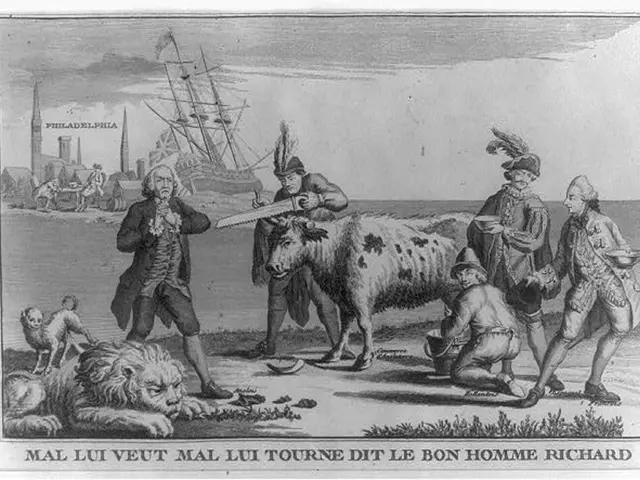Trump's Trade Agreement and Merz's Unmaterialized Honeymoon
The German Chancellor, Friedrich Merz, is navigating a complex political landscape following the announcement of the US-EU trade deal on July 27, 2025. The agreement, which imposes a 15% tariff on most European imports to the U.S., has faced criticism within Europe for disproportionately favouring the U.S. and creating economic strain for European exporters.
The tariff hike, although lower than the initially threatened 30%, is more than triple the average tariff Europe faced before. This has led to political and economic criticism, complicating Merz's position domestically and with EU partners.
The deal also requires careful negotiation to balance the commitments from the EU to purchase large volumes of U.S. energy and military equipment with European economic interests. This balance may be politically sensitive for Merz, as the deal strengthens U.S. manufacturing and economic interests while intensifying European dependence on the U.S. and restricting Europe’s trade policy autonomy.
Moreover, the agreement addresses digital trade barriers and supply chain resilience with cooperation on export controls and investment reviews. Enforcing these new rules amid ongoing tensions around trade and technology policies will demand significant political capital from Merz.
In addition to managing the political fallout of the tariffs, Merz is also facing an uphill coalition battle with the SPD over the appointment of two SPD nominees for the constitutional court. The trade accord interrupts what has been a generally positive foreign policy record for Chancellor Merz.
Furthermore, the trade deal has been considered a heavy defeat for EU negotiators, with Michel Barnier, a former EU negotiator, terming it an 'admission of weakness' resulting from 'poor choices'. French Prime Minister Francois Bayrou called the accord a 'dark day' for Europe which had 'resigned itself to submission'.
Despite these challenges, the private sector has vowed to invest €631bn in coming years, and Deutsche Bank has estimated that gross domestic product could rise as much as 2% in 2026, up from 0.5% previously forecast. The trade deal is expected to bring back buoyancy to the German economy.
However, there is doubt about the apportionment of 'green' investments in the infrastructure improvements plan, and Merz's party is facing SPD resistance on spending cuts that aim to allow asylum seekers to apply for work and put more pressure on unemployed people to find jobs.
The Christian Democratic Union/Christian Social Union (CDU/CSU) is polling neck-and-neck with the extreme right Alternative for Germany (AfD), adding to the political pressure on Merz. Reaction to the deal is considerably more hostile in France than in Germany, opening potential for discord between Paris and Berlin.
Policy-makers at the European Central Bank may be more open to a further quarter-point easing of interest rates when they meet on 10-11 September, potentially offering a financial cushion to Merz as he navigates these complex challenges.
[1] "German Chancellor Friedrich Merz Faces Challenges Amid US-EU Trade Deal." The Guardian, 28 July 2025. [2] "US-EU Trade Deal: What You Need to Know." BBC News, 27 July 2025. [3] "Analysis: What Does the US-EU Trade Deal Mean for Europe?" The Economist, 28 July 2025.
Read also:
- Court petitions to reverse established decision on same-sex marriage legalization
- Commemoration of 200 Days of American Resurgence Unveiled
- Minister Bärbel Bas expresses doubts about her tenure as a minister following a recent interview during the summer.
- Politicians from both Republican and Democratic parties are urging President Trump to maintain the security agreement with Australia and the United Kingdom.








